Texas legislators want to know how HB 900 has affected Texas schools. Let's tell them.
Texas schools are becoming book deserts.


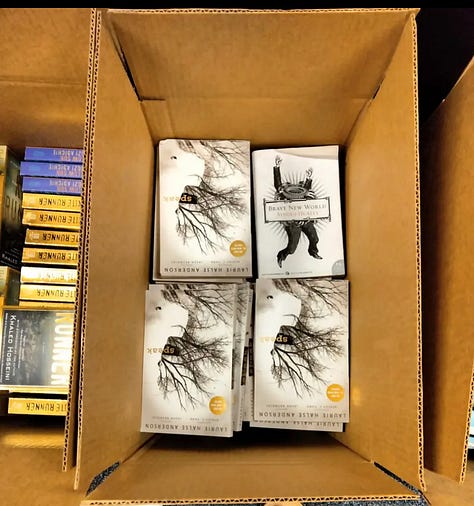
The Education Committee of the Texas Senate is meeting tomorrow (Wednesday, September 18) to discuss the interim charges given to them by Lieutenant Governor Dan Patrick. One of those interim charges is to “monitor the implementation of legislation” addressed by the committee and to “make recommendations for any legislation needed to improve, enhance, or complete implementation of those laws passed in the 88th Legislature.” Specifically, Patrick asked for help monitoring “oversight of public school library procurement and content policies.”
That means HB 900, the anti-book “READER Act” designed to remove books en masse from Texas schools. Half of the law has been enjoined as likely unconstitutional by the extremely conservative 5th Circuit Court of Appeals. Nonetheless, the remaining parts of the law have wreaked havoc on education on the state, and we at Texas Freedom to Read Project intend to let the members of the committee know exactly how.
You can, too: If you have a story about how HB 900 has affected your kids, your students, your work—please let the committee know. We know that next legislative session they’re going to be told that HB 900 doesn’t go far enough, and that not enough books have been removed from schools, so we need to tell them right now how bad we’re hurting in Texas schools.
Today, Texas Freedom to Read Project sent committee members a letter detailing the law’s detrimental effects we’ve documented since the start of the last school year. Here’s what we told them:
Some districts have stopped buying books for their libraries, or slowed purchases to a trickle.
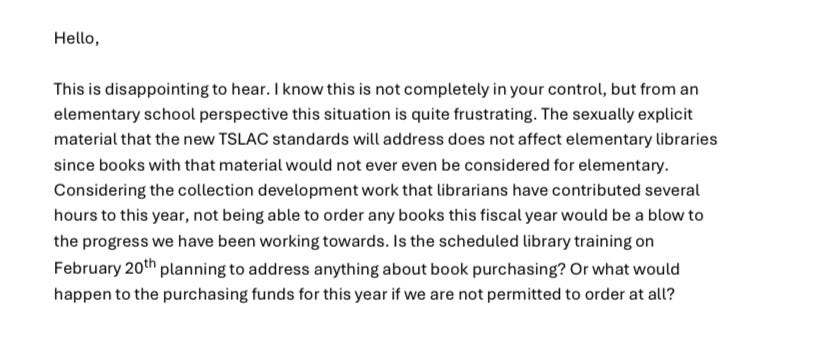
I’ve written before about Plano ISD, which announced a library purchase freeze early in the 2023-2024 school year that it tied explicitly to the passage of HB 900. Not only did the district not purchase a single book for its libraries for an entire school year, public information requests reveal just how damaging that freeze has been. Here are two telling emails, acquired through public information requests. In this one, an elementary librarian expresses deep frustration at not being able to order ANY books for her school. In the second, an administrator reprimands a different elementary librarian for personally purchasing PreK board books to fill a need in her library. “Because there is a freeze on all library book ordering, regardless of funding source … no library book purchases of any kind should be made,” the administrator says.
As I wrote this summer, Plano’s purchase freeze was finally lifted in July. But other districts have implemented more permanent measures. Texas Freedom to Read Project has reported on Katy ISD, which announced in February that librarians would no longer be allowed to order books they haven’t read in their entirety. Large school districts typically order thousands of books per year, far more than any one librarian (or group of librarians) could possibly read, so the policy serves as a functional freeze on new book purchases. The policy echoes a similar one in Carroll ISD, where, parents tell us, no books have been ordered for the senior high school library in the past two school years.
Classroom Libraries Have Been Emptied and Shuttered.
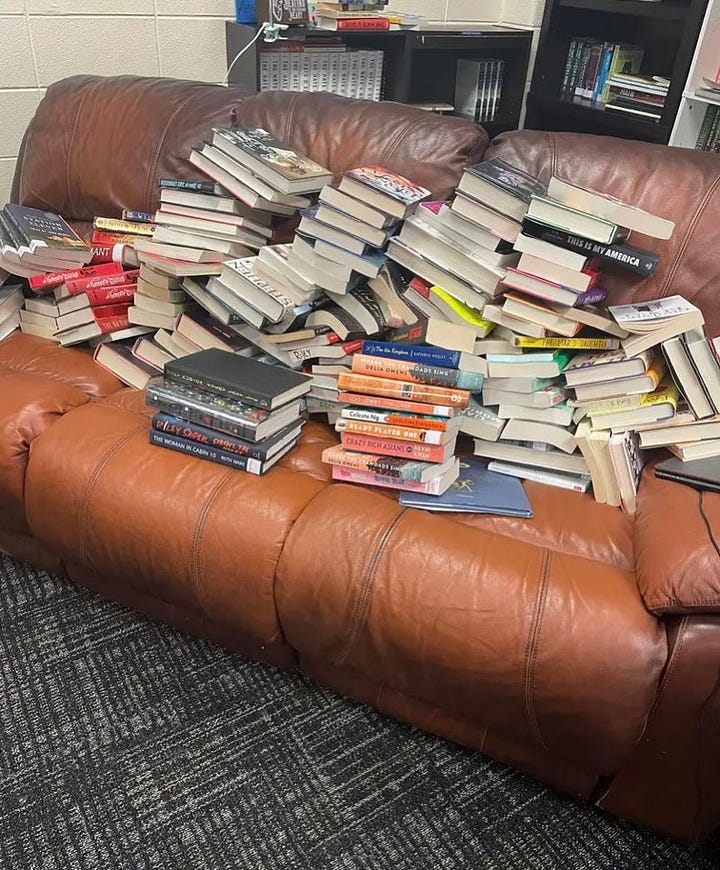
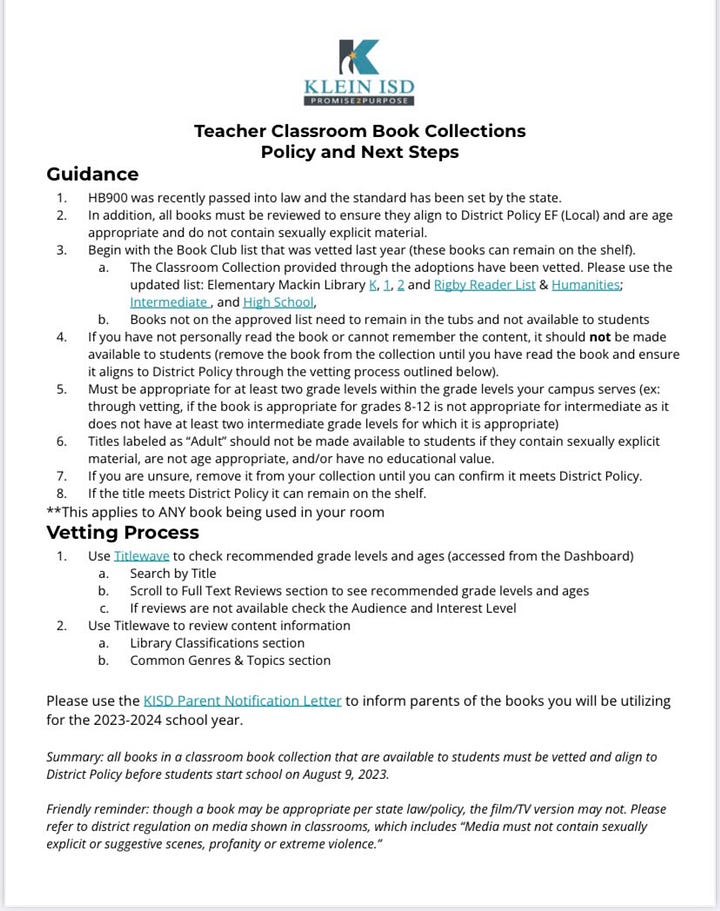
In late July 2023, Klein ISD, citing HB 900, sent a memo to its teachers with updated guidance for classroom libraries. The memo outlined a multi-step process teachers would have to complete in order to keep on their classroom shelves any book not on a (small) pre-approved list. The steps included reading the book in its entirety, verifying its recommended grade level, and judging its sexual explicitness, age-appropriateness, and educational value. “If you are unsure,” the directive continued, “remove it from your collection until you can confirm it meets District Policy.”
The directive came days before the start of school. Teachers—who often have hundreds of books in their classrooms—were given no time to complete these steps. Unsurprisingly, many chose to close or empty their classroom libraries rather than risk trouble with their district. We talked to two teachers in the district who removed all or almost all of the books from their classroom, and who described other teachers on their campuses doing the same. One said she had boxed up 1200 books from her own classroom collection with boxes she paid for herself. “At one point yesterday I closed my door and sat with my back against the wall and just sobbed,” she told us.
Teachers in other districts have reported similar directives, with similar consequences. Classroom libraries are vital points of contact between students and books—especially important as districts reduce resources for campus libraries due to budgetary constraints.1 These classroom collections, often painstakingly curated by teachers and paid for with their own money, are meant to both supplement the curriculum and foster engagement.
But, after the HB 900’s passage, schools increasingly see classroom libraries as liabilities. And Texas students are more and more likely to walk into classrooms with few or no books.
Classics and Works of Obvious Literary Worth Have Been Removed from Classrooms & Libraries.
District interpretations of HB 900 have affected the quality of books available in schools, too–not just the quantity. At the August meeting of the Conroe ISD Board of Trustees, Board President Skeeter Hubert expressed frustration that following the law’s passage his district had removed books that he recognized were of obvious literary worth.2 Hubert pushed for the revision of the district’s policies and procedures regarding library and classroom books. These objections came after the district was forced by its own policies to send a number of well-regarded books, including Brave New World, The Color Purple, and Jesmyn Ward’s Salvage the Bones, to auction after removing them from classroom collections. “Nobody wants porn in the library,” said Board President Skeeter Hubert. “But I believe that there is difference between porn, which is arousal and titillating and all of that stuff, and discussing sensitive issues, like in The Color Purple when you’re talking about rape and incest. That is not pornography.”
But Hubert was reminded by a fellow board member that with “some of this, we really don’t have a choice,” and that books were removed specifically with the intent of keeping the district in line with the HB 900.3
Versions of this story are playing out across the state. Worried about falling afoul of the law, districts are removing books that have been on their reading lists for years, even decades. Again, we’ve documented this repeatedly at Texas Freedom to Read Project: districts removing books that regularly appear on AP exams; districts removing beloved children’s books because of cartoon nudity or perceived “gender fluidity”; districts banning from their libraries books that a few years ago they were recommending as summer reading.
Teachers Are Struggling to Do Their Jobs.
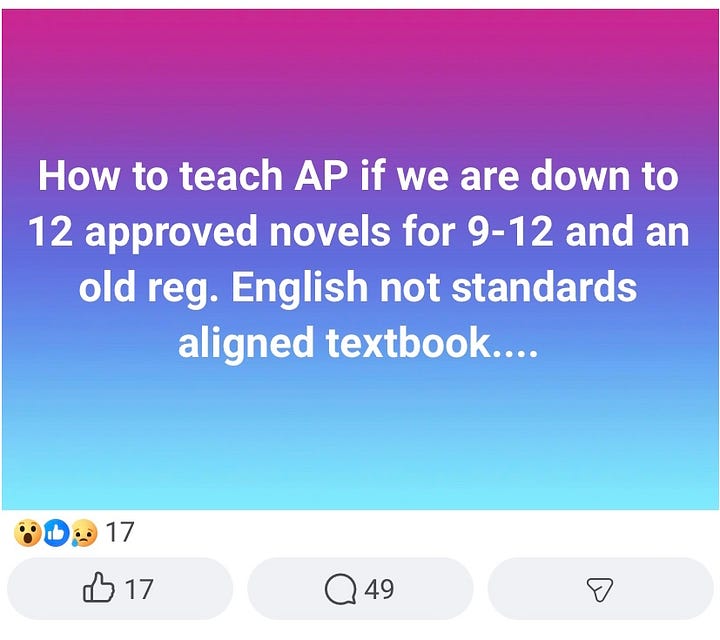

Given all the above, it’s no surprise that Texas teachers are flooding social media support groups asking for help doing their job while navigating this new, restrictive environment. In June, a teacher from a small suburban school system in the DFW Metroplex wrote to a help group for Advanced Placement English teachers, asking for recommendations for books to teach in a district because her district’s interpretation of “new legislation” meant that she could no longer teach books she has taught for years. The books in question? Truman Capote’s In Cold Blood, Voltaire’s Candide, and Albert Camus’s The Stranger. “I am so discouraged now with this list of texts,” the teacher said.
We heard from another teacher in a rural North Texas district who asked the same help group how she was supposed to teach AP English in a place where only 12 novels were approved for all high school English classes. Later, she told us that list was whittled down even further, and she described administrators emptying her school’s book supply closet, novel by novel.
A teacher in Conroe ISD told Texas Freedom to Read Project the AP Literature curriculum at her school has been “gutted,” and that teachers were literally forced by the district to take copies of Brave New World out of their students’ hands in the middle of a unit on dystopian literature. She said that planning for her year has become impossible, because her district continues to update its list of forbidden books, often after it receives pressure from political interest groups. “Part of our problem is the shifting sand we’re on,” she said. “We have no clue what’s next.”
HB 900 is Damaging Schools Across the State; Parents Want the Legislature to Let Kids Read
We finished our letter to the Senate Education Committee by reminding them that we have documented the negative effects of HB 900 at schools in small and large districts, and in urban, suburban, and rural parts of the state. We told them that they can undo some of the damage by ensuring all portions of the current library standards are enforced—including the parts book-removers tend to ignore, like the portion that says book reconsiderations should be conducted by “a committee charged with the review of the item in its entirety.” And we emphasized the fact that, as parents, we’re upset that overreaching interpretations of HB 900 are depriving us of our right to provide our children with fundamental elements of education: the ability to read freely and enjoy the full benefits of libraries and literary instruction.
But we also reminded them that a big part of the problem is the atmosphere of intimidation that some political extremists have aimed at librarians, teachers, and school officials. We said that we know they will be asked to extend the reach of HB 900 in the next legislation, and to broaden the categories of books that can be banned from schools and public libraries, and to raise the potential penalties for educators (and, yes, booksellers) who make available books that these extremists consider “harmful.” As bad as HB 900 has been for Texas readers, the next legislative session has the potential to be worse. And we told the Education Committee that that is not what Texas parents want.
Click here to add your voice to ours!
Spring Branch ISD, Keller ISD, and Cy-Fair ISD have all eliminated or drastically reduced the number of librarians employed in their districts. A recent investigation by Houston Public Media found that, in Cy-Fair ISD, the reductions resulted in library closures and diminished access to books for students.
See also “What are we doing here? These are classics.”
Texas Freedom to Read Project disagrees that HB 900 requires the removal of books like Brave New World, Beloved, or The Color Purple. But many district leaders believe it does, or are being intimidated into acting like it does by aggressive demands from extremist groups like Citizens Defending Freedom.




